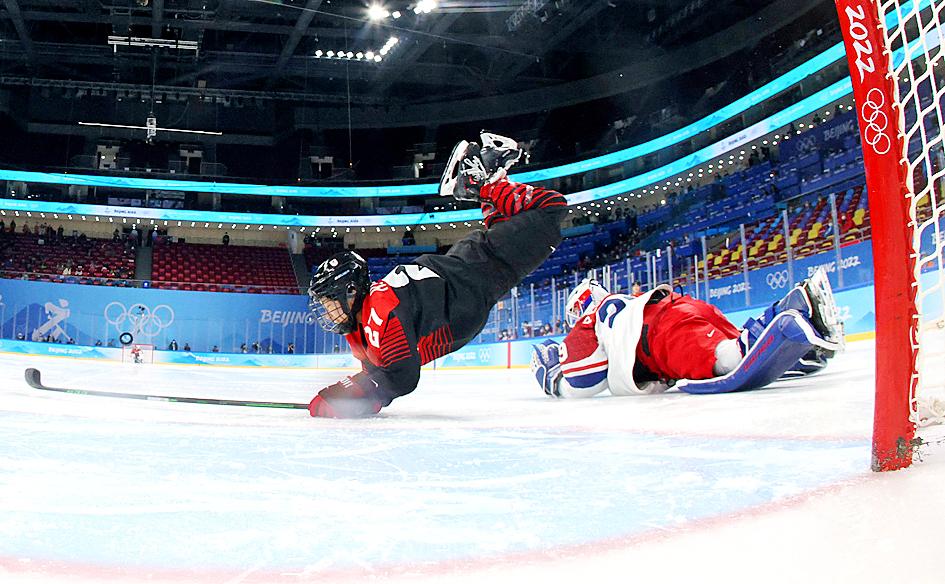Not many years ago, members of Japan’s women’s ice hockey team were delivering pizzas to support themselves and keep their competition dreams alive.
Tomorrow, they are to take to the ice against Finland in the quarter-finals and make history as the first Japanese ice hockey team, men’s or women’s, to advance to the knockout round at the Olympics with their eyes firmly set on taking a medal.
“For us as a team, it’s only one stage along our journey,” defender Ayaka Toko, who, like a number of her teammates, also played in the Sochi 2014 and Pyeongchang 2018 Games, told Japanese media after Tuesday’s 3-2 win against the Czech Republic.

Photo: AFP
“We’ve been aiming at a medal these past four years and we’re only at the start,” she said. “We won’t want to say ‘we’re close,’ we want something tangible.”
It has been a long road to this point for “Smile Japan,” a nickname they gave themselves as encouragement during the qualifying process for Sochi.
First playing at the 1998 Nagano Games due to host nation privileges, where they lost all five games, the team qualified for Sochi despite their sport being perpetually overshadowed by soccer and baseball in Japan.
Working odd jobs, such as delivering pizzas, was the only way team members could earn money and gain the flexible hours they needed to keep their Olympic dreams alive.
After they qualified for Sochi, where they ultimately finished seventh, the Japanese Olympic Committee threw its weight behind them, helping all the players, except students, find full-time work at companies and businesses willing to hire Olympians.
The team climbed still higher at Pyeongchang to finish sixth, where they claimed their first Olympic win — against a unified Korean hockey team consisting of players from North Korea and South Korea in a match rife with political and cultural overtones.
Long-term national rivalry between the Asian neighbors spilled over into the arena, with boisterous chants of “Let’s Go Japan” being met with “Let’s Win Korea” — and an explosion of cheers when Korea scored, although Japan claimed the game 4-1.
This time, their world No. 6 ranking gained them an automatic qualification.
Although the Group B that Japan topped with its Tuesday win is comprised of lower seeds, including Denmark and the Czech Republic, the team have for years far outshone their male Japanese counterparts — who last qualified for any Games in 1980, outside of their automatic Nagano qualification.
The long popularity of men’s ice hockey in the northern hemisphere might work against Japan’s men, while modern ideas of gender parity likely help its women in a smaller competitive population, said Hirotaka Matsuoka, a sports marketing professor at Tokyo’s Waseda University.
“Women’s ice hockey has a smaller number of players than men’s, and there are probably not as many countries that are focusing on improving their athletic level,” he said.
Despite their success, “Smile Japan” still fights for attention in Japan.
Yesterday, all eyes were focused on men’s figure skating and the performance of double Olympic champion Yuzuru Hanyu, who ultimately finished fourth.

Freddie Freeman homered and drove in four runs, Shohei Ohtani also went deep and Roki Sasaki earned his first major league win as the Los Angeles Dodgers beat the Atlanta Braves 10-3 on Saturday night for their seventh straight victory. The Dodgers have won the first two games of the series to improve to 5-0 against Atlanta this year. Los Angeles’ three-game sweep at home early in the season left the Braves 0-7. Sasaki allowed three runs and six hits over five innings. The 23-year-old right-hander gave up a home run to Ozzie Albies, but received plenty of offensive support in his

Bayern Munich on Sunday were crowned German champions for the 34th time, giving striker Harry Kane his first major trophy, after second-placed Bayer 04 Leverkusen drew 2-2 at SC Freiburg. Bayern’s 3-3 draw at RB Leipzig on Saturday, when the Bavarians came from two goals down to take the lead before conceding a stoppage-time equalizer, meant defending Bundesliga champions Leverkusen needed to win at Freiburg to delay the title party. Leverkusen were two goals down before scoring twice in the final 10 minutes, but Xabi Alonso’s side could not find a third, as Bayern reclaimed the title at the first attempt after

INTER AWAIT: Superb saves by PSG ’keeper Gianluigi Donnarumma inspired the victory, as Arsenal were punished for misses, including one by Bukayo Saka Arsenal on Wednesday fell short on the big stage again as their painful UEFA Champions League semi-final exit against Paris Saint-Germain left Mikel Arteta to rue his club’s failure to provide him with enough attacking options. Arteta’s side were unable to reach the Champions League final for the first time in 19 years as PSG clinched a tense 2-1 win at Parc des Princes. Trailing 1-0 from last week’s first leg in London, the Gunners made a blistering start to the second leg, but could not convert their chances as Gianluigi Donnarumma’s superb saves inspired PSG’s 3-1 aggregate victory. Arsenal were punished for

THRILLER: Raphinha gave Barca a 3-2 lead with two minutes remaining of regular time, but Francesco Acerbi equalized the game in the second minute of added time Davide Frattesi on Tuesday fired Inter into the UEFA Champions League final with an extra-time winner that gave the Italians a stunning 4-3 triumph over Barcelona, 7-6 on aggregate. Italy midfielder Frattesi won a tie for the ages under a downpour in Milan when he lashed home in the 99th minute, sending a packed and rocking San Siro wild with joy. Simone Inzaghi’s team will face either Arsenal or Paris Saint-Germain at the end of this month in Munich, Germany, where they would feel they have a great chance to be crowned kings of Europe for a fourth time after